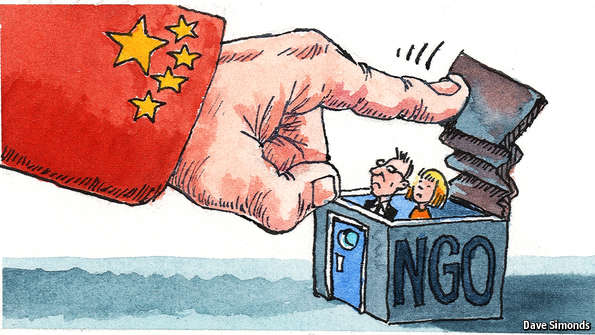The Chinese government is preparing to pass a new draft law that will regulate the activities of foreign non-governmental organizations, requiring these groups to register with the Ministry of Public Security and find an official sponsor in order to operate. The new law is part of a broader trend under President Xi Jinping’s administration to rein in civil society. From The Economist:
Now the party proposes to squeeze NGOs even harder, particularly those with foreign connections. A new draft law bars any Chinese NGO from receiving foreign funding (see article). It also sets out strict rules for foreign NGOs operating in China. These rules, according to the minister for public security, are intended to “protect the legitimate rights and interests of foreign NGOs” in the country. Really?
Under the new law, all foreign NGOs would have to find an official sponsor and register with the ministry of public security (rather than the less fearsome ministry of civil affairs, which previously dealt with such matters). Those that cannot find a sponsor will have to leave. Charities that look after sick children and steer clear of politics will doubtless be all right—and may even find the red tape a little easier. Those that venture onto controversial turf—agitating for human rights, for example, or pushing for legal reform—may have to close.
The draft law’s wording is so broad and vague that it could apply even to foreign trade associations (the American Chamber of Commerce in China has expressed alarm). Any non-profit group that wants to visit China would also require a sponsor. In theory, a student exchange or a tour by an American college orchestra could be cancelled because a pro-Tibet group once spoke on their campus back home. The law allows the police to burst into the offices of a foreign NGO at any time and go through their papers to make sure they are not doing anything that undermines national security, public order or “morality”. This is a licence to intimidate anyone the party—or a local official—does not like. [Source]
The Economist reports that the vast majority of the approximately 1, 000 foreign NGOs present in China have previously operated in a grey area, often functioning without required registration and associated legal status:
Until now foreign and Chinese groups have operated in a legal grey area. Many are unregistered but still able to function; some are registered as businesses. They have not had specific permission to do anything. But because much of their work has been with the poor or distressed, and has helped enhance social stability, they have been tolerated. “The grey area was dangerous but also liberating. You could get a lot done,” says Jessica Teets of Middlebury College in Vermont. The new draft law looks to be getting rid of the grey area.
By letting some NGOs register formally, the law would allow them to open bank accounts for the first time and take part in official activities. But it would also bring closer monitoring, and requires groups to hire employees only through official channels. Any group dealing with sensitive issues would be unlikely to find a sponsor and would be forced to close. The law uses vague terms about endangering national security that can be used to justify any move against an NGO.
“Party leaders are shooting themselves in the foot,” says Shawn Shieh of the China Labour Bulletin in Hong Kong. He believes the police do not have the resources or knowledge to deal with the thousands of foreign groups that would need to register. Perhaps the party does not care. Disrupting some anti-poverty work is “the necessary cost of maintaining control over the groups it deems subversive,” says Jia Xijin of Tsinghua University’s NGO Research Centre. [Source]
Once passed, the new law will limit foreign NGOs’ capacity to provide important services and their ability to draw attention to issues overlooked by the central government. The deadly explosion at a hazardous chemical warehouse in Tianjin is a prominent example of the kind of tragedies that could have been forestalled had there been an effective civil society to pressure the chemical company to comply with laws and regulations surrounding the storage of hazardous materials.







